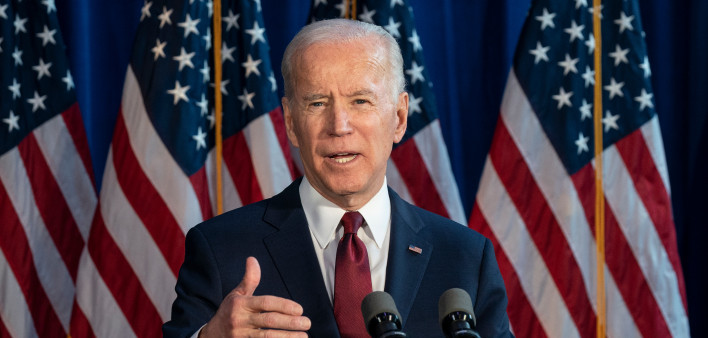President Joe Biden’s administration revealed an outline of its first budget request, which covers fiscal year 2022. The budget includes an increase of $267 million for federal efforts to end HIV. If Congress approves it, the total budget for the domestic HIV plan will be $670 million.
President Donald Trump launched the 10-year federal initiative “Ending the HIV Epidemic: A Plan for America” in 2019. The plan aims to lower new HIV rates by 75% by 2025 and by 90% by 2030. This would amount to fewer than 3,000 HIV cases a year. The plan focuses on four pillars: diagnoses, treatment, prevention and rapid detection of new cases. To learn more about the initiative, see “Plans to End the HIV Epidemic at Home and Abroad” and “How’s Your State Doing in the Race to End the HIV Epidemic?”
“We thank President Biden for demonstrating his commitment to ending HIV in the United States by including this substantial funding increase in his budget to ramp up the Ending the HIV Epidemic Initiative,” said Carl Schmid, executive director of the HIV+Hepatitis Policy Institute, in a press release. “While it falls short of what the community has requested, if this funding is realized, it will continue the momentum already created and make further progress in ending HIV in the U.S. Efforts to end HIV will help eradicate an infectious disease that we have been battling for the last 40 years and help correct racial and health inequities in our nation.”
As the HIV+Hepatitis Policy Institute notes, Trump’s budget request last year called for an increase of $412 million for the HIV plan’s second year; Congress eventually approved $137 million.
You can read the outline of Biden’s request for discretionary funding for fiscal year 2022 in this White House document. In a section that pertains to the Department of Health and Human Services’ funding priorities, Biden’s request spells out that the administration is committed to ending the HIV/AIDS epidemic. The budget notes:
The discretionary request includes $670 million, an increase of $267 million over the 2021 enacted level, to support the critical effort to end the HIV/AIDS epidemic in the United States. Investments in [the Centers for Disease Control and Prevention], the Health Resources and Services Administration (HRSA), the Indian Health Service (IHS), and [National Institutes of Health] aim to reduce new HIV cases aggressively while increasing access to treatment, expanding use of pre-exposure prophylaxis (also known as PrEP), and ensuring equitable access to services and supports.
In total, the president’s 2022 discretionary request includes $131.7 billion for the U.S. health department—a $25 billion, or 23.5%, increase from 2021.
Among other goals, HHS’s other priority budget items include:
- Strengthen the national and global readiness for the next public health crisis
- Advance the goal of ending the opioid crisis
- Promote biomedical research and establish the advanced Research Projects Agency for Health (ARPA-H)
- Prioritize mental health
- Promote health equity by investing in services for American Indians and Alaska Natives
- Promote health equity by addressing racial disparities
- Address the public health epidemic of gun violence in America
- Protect rural health care access and expand the pipeline of rural health care providers
- Support survivors of domestic and gender-based violence
- Expand access to family planning health care services
- Increase funding for civil rights enforcement.
What about global efforts to fight AIDS, for which the United States is a major source of funding? In short, the budget seeks an increase of $800 million for all global health programs. A section of Biden’s budget outline notes:
The discretionary request would expand American leadership in global health security in order to address long-term impacts and work to prevent, prepare for, and respond to future infectious disease outbreaks, whether naturally occurring, accidental, or deliberate. The discretionary request provides $10 billion for global health programs, of which nearly $1 billion would fund global health security programs, an increase of over $800 million above the 2021 enacted level. This additional $1 billion would expand Global Health Security Agenda capacity-building programs to additional nations and increase investments in crosscutting research and viral discovery programs to detect and stamp out future infectious disease outbreaks before they become pandemics. These funds would also support a new health security financing mechanism, developed alongside U.S. partners and allies, to catalyze increased investment in pandemic prevention and preparedness for future outbreaks. These global health security programs would build upon global health infrastructure, developed through decades of U.S. investment, and the $10 billion in foreign assistance for the COVID-19 pandemic provided in the American Rescue Plan Act of 2021.
Biden’s budget request “won’t put the world on track to end AIDS,” say advocates with Health GAP, an international advocacy group focused on ensuring all people across the globe have access to HIV meds. In fact, they want Congress to boost funding for the President’s Emergency Plan for AIDS Relief (PEPFAR) by $750 million for fiscal year 2020 and $2.5 billion over the next years.
“Biden has the opportunity to be the president who saves countless lives by ending AIDS as a global public health threat, but time is running out,” said Matthew Rose, Health GAP’s director of U.S. policy and advocacy. “It will take a more significant commitment and bold leadership that brings sufficient funding, a qualified nominee to lead the response, and human rights and evidence-based policies developed in deep consultation with the most affected communities.”
Extra funding is needed, Health GAP notes, in part because COVID-19 has caused major delays in HIV testing and treatment across the globe. The advocates also want Biden to name qualified people to lead PEPFAR and to serve as U.S. global AIDS coordinator.







Comments
Comments